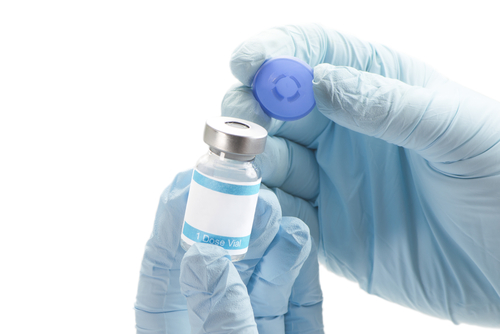Earlier Meningitis Vaccine Booster May be Necessary for CAD Patients on Anti-complement Therapy, Study Suggests
Written by |

To lower the risk of meningitis infection in patients with cold agglutinin disease (CAD) treated with Soliris (eculizumab), a booster given shortly after the first vaccination may be required, a study suggests.
Because patients who receive therapies that target the complement system — such as Soliris — are at a higher risk of meningitis, vaccines against the infection are required before taking the medication.
However, the vaccine’s effect wears off with time, and re-vaccination is recommended every three years. Researchers in this study found that a booster given within eight to 12 weeks after the first shot may further reduce the risk of infection and lead to a more potent response in CAD patients on anti-complement therapies.
The study, “Serologic response to meningococcal vaccination in patients with cold agglutinin disease (CAD) in the novel era of complement inhibition,” was published in the journal Vaccine.
The complement system — a set of more than 50 blood proteins that form part of the body’s immune defenses — plays an important role in the destruction of red blood cells characteristic of CAD.
Targeting the complement system is a promising therapeutic approach to CAD, specifically for patients with resistance to B-cell-directed therapies — the cells that produce antibodies — such as Rituxan (rituximab).
However, therapeutic targeting of the complement system system can make CAD patients more vulnerable to infections, such as bacteria that can cause meningitis like Neisseria meningitidis, Streptococcus pneumoniae (S. pneumoniae), and Haemophilus influenzae serotype b (Hib).
Therefore, vaccination against meningitis is mandatory for CAD patients undergoing anti-complement therapy.
A team of researchers in Essen, Germany, evaluated the safety and efficacy of Menveo, GlaxoSmithKline’s vaccine against four subtypes (serogroups) of Neisseria meningitides, the serogroups A, C, W, and Y, in CAD patients previously treated with Alexion’s Soliris (eculizumab), a therapy targeting the complement system.
The analysis included nine CAD patients enrolled in the Phase 2 DECADE trial (NCT01303952), the goal of which was to evaluate Soliris’ efficacy and safety in CAD.
Enrolled patients had no prior vaccination against meningitis, and none developed meningococcal infection during follow-up.
Researchers measured the levels of serum bactericidal antibody (SBA) — which are used to monitor the immune system’s response to the vaccination and, therefore, its efficacy. They measured the SBA levels in patients’ blood after four and 26 weeks of treatment with Soliris.
In the first analyses after a median of 42 days post-vaccination, protective antibodies against meningitis bacteria serogroup Y were observed in six patients (75%), and five patients (62.5%) developed antibodies against serogroup W.
Protective antibodies against the serogroup C were detected in only three patients (37.5%) and even lower for serogoup A (two patients, corresponding to 25%). Only one patient developed a full immune response (antibodies against all the serogroups).
After a median of 6.4 months post-vaccination, there was an evident decline of SBA levels, with levels dropping to non-protective for serogroups A and Y in three patients.
Overall, these findings suggest that blood analyses in patients undergoing anti-complement therapy “are useful to monitor immune responses to vaccines in these special patients and should further be implemented in current guidelines as these patients are at an increased risk for contracting” meningitis, the researchers wrote.
Moreover, they added that an earlier vaccination booster could be necessary to minimize infection risk and that vaccination against additional bacteria, like S. pneumoniae and H. influenzae serotype B, “might further reduce the risk of infectious complications.”
“Physicians and patients must be aware and vigilant for meningococcal disease at all times,” the study concluded.





